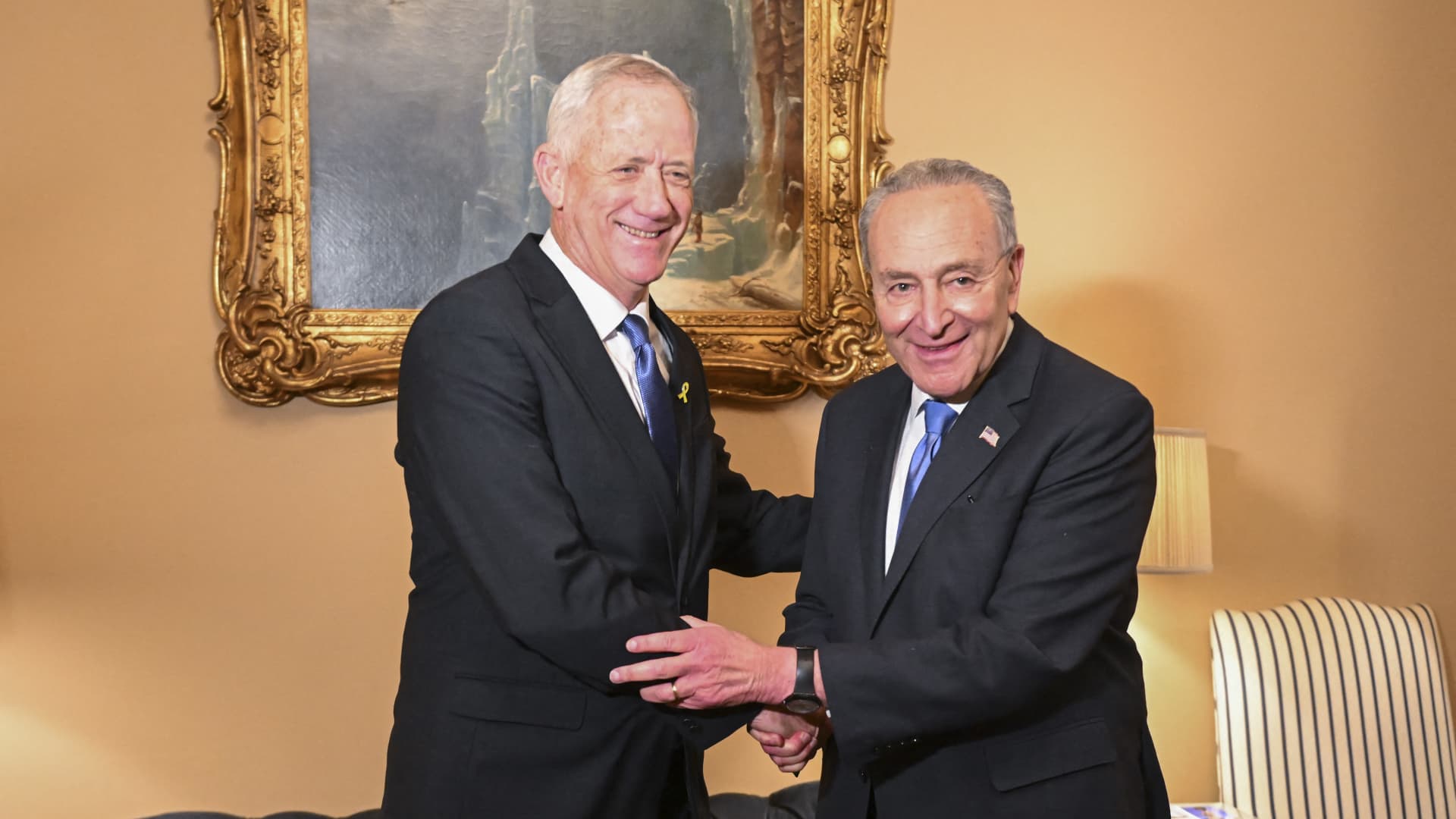
- Visible tensions are appearing in the historically close relationship between the White House and Israel, as the war in Gaza becomes a worsening humanitarian disaster.
- While Biden vocally supports Israel's stated goals of defeating Hamas and rescuing the hostages, his administration has expressed increasing criticism of the way in which Israel is carrying out its operations.
- Still, the Biden administration has rejected the possibility of cutting any military aid to Israel.
Visible tensions are appearing in the historically close relationship between the White House and Israel, as the war in Gaza becomes a worsening humanitarian disaster and Israeli Prime Minister Benjamin Netanyahu resists the Biden administration's push for a change in course.
While Biden vocally supports Israel's stated goals of defeating Hamas and rescuing the hostages that the Palestinian militant group took captive during its Oct. 7 rampage in southern Israel that killed some 1,200 people, he and other administration officials have expressed increasing criticism of the way in which Israel is carrying out its operations in the Gaza Strip.
Israel's relentless aerial bombardment and expanding ground invasion, as well as the cutting of Gaza's water and power supplies, have killed more than 30,000 Palestinians there, according to Gaza's health ministry, which is run by Hamas. And Israeli restrictions on the aid that can enter the besieged enclave, which is blockaded on all sides, have pushed more than 500,000 people into famine, according to the United Nations.
Get Tri-state area news and weather forecasts to your inbox. Sign up for NBC New York newsletters.
Still, the Biden administration has rejected pulling back the military aid it is providing to Israel, and consistently provides diplomatic cover for it at the U.N., often being the sole country vetoing international demands for a cease-fire.

Biden has also stressed what his administration says is the need for an independent Palestinian state as part of the path to a durable peace — something Netanyahu ardently opposes. The right-wing Israeli leader has also rejected Biden's proposals of a leading role for the West Bank-based Palestinian Authority in Gaza's future once the war ends.
Money Report
"These and other divisions are putting the entire 'special relationship' between the U.S. and Israel under pressure I have never seen before in my lifetime," Hussein Ibish, a senior resident scholar at the Arab Gulf States Institute in Washington, told CNBC. "The relationship [between Biden and Netanyahu] is absolutely terrible."
A report by Politico in early February cited unnamed Biden administration officials describing the president calling Netanyahu a "bad f—ng guy." His spokespeople have denied it, saying that the leaders have "a decades-long relationship that is respectful in public and in private."

The reported rift appeared to worsen as Israeli war cabinet member Benny Gantz, a longtime rival of Netanyahu and considered to be more moderate, paid a visit to Washington this week at the invitation of the White House. According to a report by Axios, the visit "enraged" Netanyahu, "who ordered the Israeli embassy in Washington to not take any part in the visit or assist Gantz in any way."
Gantz reportedly faced a barrage of harsh questions and critiques from the administration over Israel's handling of the Gaza war.
CNBC has reached out to the White House and the Israeli Prime Minister's Office for comment.
Election worries and 'campaign mode'
As the U.S. General Election nears, promising a rematch between Biden and former President Donald Trump, Biden is facing a domestic challenge over his support for Israel's war in Gaza, particularly from many young liberals and Muslim and Arab Americans.
This threatens to cost him crucial votes, particularly in swing states. Vice President Kamala Harris issued harsh comments in a speech on Sunday urging a cease-fire, saying "People in Gaza are starving. The conditions are inhumane."
And during his State of the Union speech Thursday, Biden lamented the scale of suffering in Gaza, saying, "To the leadership of Israel I say this: Humanitarian assistance cannot be a secondary consideration or a bargaining chip. Protecting and saving innocent lives has to be a priority."
He was later heard on a hot mic expressing his frustration with Netanyahu, saying that the two leaders will need to have a "come to Jesus meeting."

But Netanyahu is adamant that a cease-fire would threaten the Israeli Defense Force's momentum, and that "total victory is within reach." Some observers say his rhetoric is aimed at staying in power as his domestic approval rating sits at its lowest of his more than 16 years at the helm.
"It seems to me that Netanyahu is in a full campaign mode, and that presently, its main theme is resisting the emerging Biden strategy and the president himself," said Nimrod Novik, a fellow at the Israel Policy Forum, which is dedicated to advancing a two-state outcome to the conflict.
Particularly telling, Novik said, is "Netanyahu's decision to preempt the emerging Biden strategy – which offers Israel a way out of Gaza, a hopeful change on the West Bank, as well as Saudi normalization and regional integration – by distorting this unprecedented offer and portraying it as an imposition."
"The prime minister is focused on securing and energizing his ever-shrinking base," he said of Netanyahu. "That base is as hard line as they come and responds best to nationalist machismo as in his promise to defend Israel from the imagined Biden imposition of a Palestinian state."

"I've watched the [Biden] administration express its being fed up with the Netanyahu policy, from haggling over every truck of humanitarian assistance, through announcing West Bank triggering settlement expansion at such an explosive moment, to provocations on Temple Mount on the eve of the holy Muslim month of Ramadan," Novik said.
But this is going largely ignored in the Israeli administration, he noted. "What might sound in Washington as a scream is hardly a whisper in Jerusalem."
Ibish had similar observations.
"All the American support, especially from Biden personally, is being met with total ingratitude and actually with disdain," from Netanyahu's government, he said.
"If Biden were getting more cooperation from Netanyahu [and] the Israelis, he would not be pulling away from them, albeit carefully and subtly. This is, after all, an election year, and he will have to be very careful."
Unprecedented support
Yonatan Freeman, an international relations and media lecturer at Israel's Hebrew University, believes the historically close relationship between the two countries will supersede the relationships between individual administrations and leaders.
"I think looking from a bird's eye view we have to really focus on U.S.-Israel relations. And I don't remember another war that Israel fought where it received so much support from a U.S. administration," Freeman said. "Just as one example, the airlifting of U.S. military equipment to Israel occurred almost immediately … it never stopped."
Still, he added, there is a broad perception among Israelis and many American Jews that former president Donald Trump was the most pro-Israel president in U.S. history.
"I think that this might be critical in some of the swing states where we have large Jewish and Israeli-American populations." Roughly a quarter of Americans also identify as Evangelical Christian, a group that typically is very pro-Israel.
"So yes, this is something that could impact the elections," Freeman said, adding that Biden's hope of achieving normalization between Israel and Saudi Arabia is also on hold for the time being.
"That would bring him great points in terms of Israel, but also in terms of foreign policy, where Biden is looking for successes on the world stage," he said. "But it seems like there aren't many."






